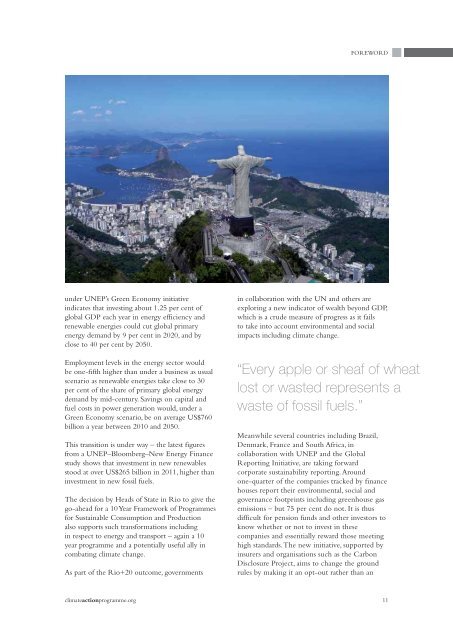Climate Action 2012-2013
Create successful ePaper yourself
Turn your PDF publications into a flip-book with our unique Google optimized e-Paper software.
FOREWORD<br />
under UNEP’s Green Economy initiative<br />
indicates that investing about 1.25 per cent of<br />
global GDP each year in energy efficiency and<br />
renewable energies could cut global primary<br />
energy demand by 9 per cent in 2020, and by<br />
close to 40 per cent by 2050.<br />
Employment levels in the energy sector would<br />
be one-fifth higher than under a business as usual<br />
scenario as renewable energies take close to 30<br />
per cent of the share of primary global energy<br />
demand by mid-century. Savings on capital and<br />
fuel costs in power generation would, under a<br />
Green Economy scenario, be on average US$760<br />
billion a year between 2010 and 2050.<br />
This transition is under way – the latest figures<br />
from a UNEP–Bloomberg–New Energy Finance<br />
study shows that investment in new renewables<br />
stood at over US$265 billion in 2011, higher than<br />
investment in new fossil fuels.<br />
The decision by Heads of State in Rio to give the<br />
go-ahead for a 10 Year Framework of Programmes<br />
for Sustainable Consumption and Production<br />
also supports such transformations including<br />
in respect to energy and transport – again a 10<br />
year programme and a potentially useful ally in<br />
combating climate change.<br />
As part of the Rio+20 outcome, governments<br />
in collaboration with the UN and others are<br />
exploring a new indicator of wealth beyond GDP,<br />
which is a crude measure of progress as it fails<br />
to take into account environmental and social<br />
impacts including climate change.<br />
“Every apple or sheaf of wheat<br />
lost or wasted represents a<br />
waste of fossil fuels.”<br />
Meanwhile several countries including Brazil,<br />
Denmark, France and South Africa, in<br />
collaboration with UNEP and the Global<br />
Reporting Initiative, are taking forward<br />
corporate sustainability reporting. Around<br />
one-quarter of the companies tracked by finance<br />
houses report their environmental, social and<br />
governance footprints including greenhouse gas<br />
emissions – but 75 per cent do not. It is thus<br />
difficult for pension funds and other investors to<br />
know whether or not to invest in these<br />
companies and essentially reward those meeting<br />
high standards. The new initiative, supported by<br />
insurers and organisations such as the Carbon<br />
Disclosure Project, aims to change the ground<br />
rules by making it an opt-out rather than an<br />
climateactionprogramme.org 11












